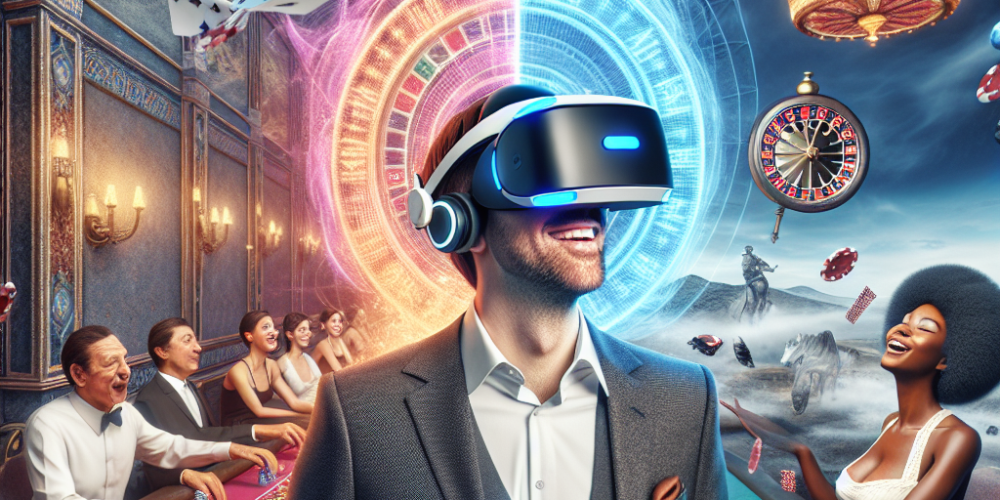The digital age has ushered in significant transformations across various sectors, and the casino industry is no exception. Over the past decade, technological advancements have paved the way for the emergence of virtual reality (VR) casinos, a concept that promises to revolutionize the gambling experience. As VR technology becomes more accessible and affordable, an increasing number of gamers and gamblers are exploring the allure of virtual casinos. This phenomenon is reshaping the gaming landscape, offering unprecedented immersive experiences that replicate the thrill of traditional gambling venues.
Virtual reality casinos utilize VR headsets to provide players with a three-dimensional, interactive casino environment. Users can walk around virtual casino floors, interact with other players, choose their preferred slot machines or table games, and place bets – all from the comfort of their homes. This intersection of technology and gambling has not only attracted gaming enthusiasts but has also sparked interest among those who typically wouldn’t visit a physical casino.
One of the key advantages of VR casinos is the enhanced player engagement and immersion it offers. Unlike standard online casinos where interaction is limited to clicking buttons, VR casinos allow for a more involved experience. Players can use hand gestures and movements, mimicking the action of pulling a slot machine lever or throwing dice, thus offering a more tactile and engaging environment. This sense of presence amplifies the gaming experience, making it more thrilling and realistic.
Moreover, VR casinos have the unique capability to overcome geographical limitations. They offer a global platform where players from different parts of the world can gather, interact, and compete against each other in real-time. This not only enhances the social aspect of gambling but also seamlessly integrates diverse gaming cultures and practices. As such, virtual reality casinos are poised to become a unifying global gaming hub in the near future.
From an economic standpoint, VR casinos present lucrative opportunities for both developers and casino operators. As the demand for more immersive and innovative gaming solutions increases, the development of VR casino technology is also accelerating. This has spurred a wave of investment in VR hardware and software, with major tech companies and gaming moguls eager to stake their claim in this burgeoning market.
However, the transition to VR-based gambling does come with challenges. Regulatory issues are at the forefront, as governments and regulatory bodies grapple with establishing guidelines that ensure fair play and prevent problematic gambling behaviors in a virtual setting. Additionally, the technology itself still faces hurdles such as improving user comfort, reducing costs, and enhancing the visual fidelity of virtual environments to create truly seamless and engaging experiences.
Despite these challenges, the future of VR casinos looks promising. Recent developments have seen more sophisticated and realistic casino simulations, with improvements in graphics, user interfaces, and accessibility. Games available in VR casinos range from traditional favorites like blackjack, poker, and roulette to more innovative offerings that are only possible in a virtual space, further expanding the appeal of this platform.
The social element of VR casinos also continues to evolve. Features such as voice chat functionality and avatar customization allow players to express themselves and create digital personas, fostering a sense of community among users. Event-driven experiences such as live concerts or special gaming tournaments are becoming increasingly common, blurring the lines between gaming, entertainment, and social interaction.
In conclusion, virtual reality casinos are set to redefine the boundaries of gaming and gambling. With their ability to offer immersive, engaging, and accessible gaming experiences, VR casinos address the ever-growing demand for innovation in the digital age. As technology progresses and more barriers are overcome, it is likely that VR casinos will become a staple in the gaming industry, offering a dazzling glimpse into the future of entertainment. This shift not only marks a significant technological milestone but also a cultural shift in how people perceive and engage with gambling environments. Moving forward, the integration of virtual reality in casinos will undoubtedly spark further innovations, continuing to transform the gaming landscape in profound ways.

Karine Gomez is an enthusiastic writer and avid gamer with a particular love for PlayStation and casino gaming. Her deep knowledge of gaming trends and casino dynamics makes her articles both informative and engaging. Karine’s passion for PlayStation games and her firsthand experience with casino play shine through in her writing, offering readers authentic insights and valuable tips.

